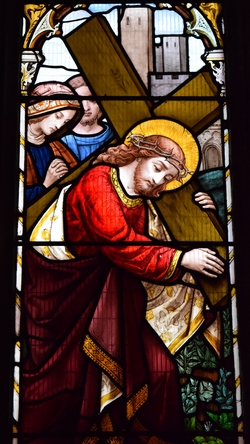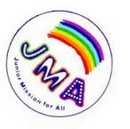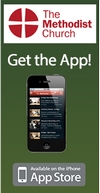Spacer
My Top Ten Hymns
Perhaps an easy one to start with as a Methodist! One of everyones favorite hymns wonderful words and music combined to warm the soul.
1. And Can It Be - Charles Wesley
Published in 1738 now most associated with music by Thomas Campbell (Sagina) written in 1825.
Why my first choice?
As a teenager I sat in a bible study led by my Father (also the Minister) with Mum there as well. We were talking about our favourite hymns and why they were our favourites.
I felt strongly called to speak of this hymn a bold statement of God's love and the faith and trust which that love instilled in me.
Perhaps because Mum and Dad were there I did not speak up at the time but someone else chose the hymn for slightly different but similar reasons. After the meeting I mentioned my urge to speak to Mum whose reply has stood me in good stead since that day, when she said to me "You will have to speak up quicker".

It is wonderful how these touching points with God stay with us through our lives. It is now forty years later and I still vividly remember the need to speak and express my need and acceptance of God's love.
Despite my often well disguised shyness (a son of the manse issue I am sure) I have tried to follow that recommendation and after many years ignoring the call became a Local Preacher in 1995 and now you can't shut me up!
I probably choose this for worship too much but its five short verses speak more clearly and memorably of God's love for us than perhaps a hundred sermons. Given the inspiration for the words, a little of which is explained below, it should perhaps not be a surprise.
Words
And can it be that I should gain
An interest in the Savior's blood?
Died He for me, who caused His pain
For me, who Him to death pursued?
Amazing love! How can it be,
That Thou, my God, shouldst die for me?
'Tis mystery all: th'Immortal dies:
Who can explore His strange design?
In vain the firstborn seraph tries
To sound the depths of love divine.
'Tis mercy all! Let earth adore,
Let angel minds inquire no more.
He left His Father's throne above
So free, so infinite His grace
Emptied Himself of all but love,
And bled for Adam's helpless race:
'Tis mercy all, immense and free,
For O my God, it found out me!
Long my imprisoned spirit lay,
Fast bound in sin and nature's night;
Thine eye diffused a quickening ray
I woke, the dungeon flamed with light;
My chains fell off, my heart was free,
I rose, went forth, and followed Thee.
No condemnation now I dread;
Jesus, and all in Him, is mine;
Alive in Him, my living Head,
And clothed in righteousness divine,
Bold I approach th'eternal throne,
And claim the crown, through Christ my own.
With the "controvesy" that "In Christ Alone" has caused by its' inclusion in Singing the Faith with its' reference to the Wrath of God, it is interesting to note that the fifth verse from the original has long been and continues to be omitted from our hymn books.
Still the small inward voice I hear,
That whispers all my sins forgiven;
Still the atoning blood is near,
That quench'd the wrath of hostile Heaven:
I feel the life His wounds impart;
I feel my Saviour in my heart
Background to the Hymn
One might be forgiven for assuming that this hymn was written by someone rescued from a life of terrible sin.
In fact Charles Wesley was ordained as a priest in the Church of England in 1735. Three years later, having just returned from a missionary trip to America, on the 21st of May 1738 after a long period reading his bible he records in his journal, "I now found myself at peace with God, and rejoiced in hope of loving Christ. My temper for the rest of the day was, mistrust of my own great, but before unknown, weakness. I saw that by faith I stood; by the continual support of faith, which kept me from falling, though of myself I am ever sinking into sin. I went to bed still sensible of my own weakness, (I humbly hope to be more and more so,) yet confident of Christ's protection. "
Two days later, his journal reported that he had begun writing a hymn at nine and finished it that day. This is thought likely to have been "And Can It Be". This and "Where Shall My Wondering Soul Begin" were the first of the over 6,000 hymns he wrote.
You can read Charles' Journal online The section for these few days is here..
There is some debate whether this was the hymn John Wesley sang on his own conversion three days later but it is generally accepted that this was more likely to be "Where Shall My Wondering Soul Begin".
"And Can It Be" was first published in John Wesley's Psalms and Hymns in 1738, then in Hymns and Sacred Poems in 1739. It is number 345 in our current Hymn Book "Singing the Faith".
From the Book "The Methodist Hymn Book Illustrated by John Telford B.A. (1906)
These verses no doubt describe Charles Wesley's own conversion, but "Where shall my wondering soul begin?" is generally accepted as "the hymn" written at the time and sung when John Wesley was brought in triumph.
This hymn has its link to Wesley's death bed. On the last Sunday afternoon of his life, after he had said "There is no need for more; when at Bristol, my words were
I the chief of sinners am,
But Jesus died for me,
Miss Ritchie writes, "seeing him weak and not able to speak much, I said, "Is this the present language of your heart, and do you now feel as you did?" He replied, "Yes" I then repeated-
Bold I approach the eternal throne,
And claim the crown, through Christ my own.
And added, "'Tis enough, He, our precious Emmanuel, has purchased, has promised all." He earnestly replied, "He is all, He is all," and then said, "I will go." I said, "To joys above; Lord help me to follow you," to which he replied "Amen"."
At Evesham, in August, 1739 Charles Wesley says a drunken servant of Mr Steward's "was struck" Wed, Aug, 22. This morning the work upon poor Robin appeared to be God's work. The words that made the first impression were-
"Tis mercy all immense and free,
For O my God it found out me!"
He now seems full of sorrow, and joy, and astonishment, and love. The world, too, set to their seal that he belongs to Christ."
Dr. B. Gregory gives an attractive picture (Recollections Page 55) of his father's colleague at Patrington, Rev. William Kaye, who reached home one Saturday from his weeks round of appointments, and died the same evening. His last words were, "No condemnation now I dread," &c. After repeating the verse he added, "Yes Jesus is the foundation of my hope," and then died.
Dr Gregory's book is available on the Internet Archive - the quote is on page 58 of the version held there and can be accessed Here...









